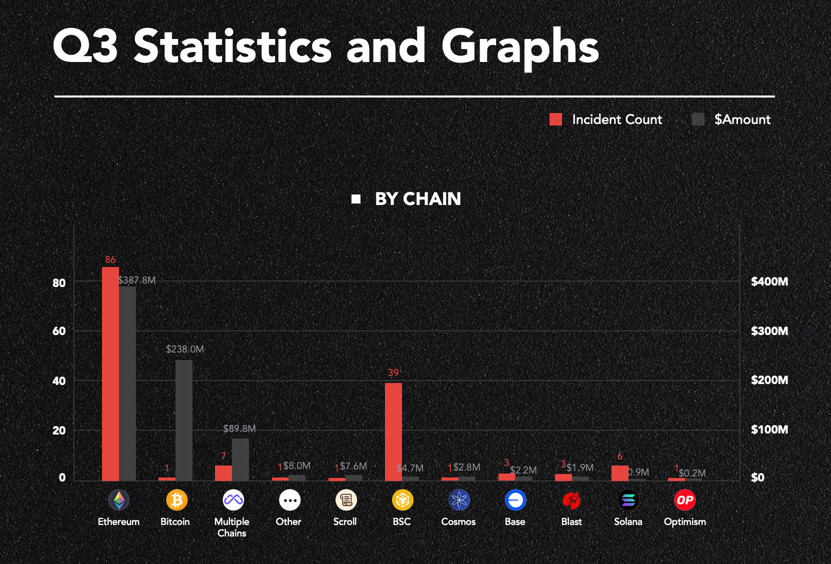Bitcoin Whale Loses $238M in Shocking Hack: Is the Crypto Industry Facing a Security Crisis?


In Brief
In Q3 2024, hackers stole $750 million, raising security concerns and highlighting the need for improved security and awareness in the crypto community.

With hackers taking off with an astounding $750 million in stolen assets in the third quarter of 2024, the industry’s ongoing security concerns have been brought to light. This quarter’s 9.5% rise in losses over the previous one highlights how urgently the crypto community needs to improve security and awareness.
These assaults are now more widespread and sophisticated than ever before, impacting many different platforms and users in the cryptocurrency industry. Cyber dangers have affected every industry, from decentralized banking systems to centralized exchanges. The majority of these security problems affected the Ethereum network in particular; 86 incidences were documented, with damages totaling more than $387 million.
Bitcoin Whale Loses $238 Million in Shocking Wallet Compromise
One of the most significant events of the quarter included the hacking of a Bitcoin whale’s wallet, which led to the theft of 4,064 BTC, or almost $238 million. A large amount of the quarter’s losses were caused by this one incident, which is a sobering reminder that even well-resourced and seasoned people may become targets of sophisticated assaults. The event calls into question high-net-worth cryptocurrency holders’ security procedures and the possible need for more reliable key management systems.
The theft of nearly $235 million worth of assets during the WazirX exchange breach dealt a serious blow to the cryptocurrency ecosystem. In addition to making a major gap in the quarter’s losses, this incident brought to light the persistent weaknesses in centralized exchanges. The WazirX hack highlights the vital significance of putting in place and upholding cutting-edge security procedures and should serve as a lesson to both users and exchange operators.
Exchange hacks are a common theme, which suggests that there is a systemic problem in the cryptocurrency sector. Centralized systems continue to be popular targets for thieves despite years of development and a heightened understanding of security threats.
The concentration of significant amounts of digital assets on these exchanges makes hackers an attractive target, and they are always coming up with new ways to get over security measures. This continuous difficulty casts doubt on the centralized custodian services’ long-term sustainability in the cryptocurrency ecosystem and might hasten the transition to decentralized alternatives.

Photo: CertiK
It is important to note that fewer cases have been recorded, even if the overall value of stolen assets has grown. This pattern implies that attackers are targeting higher-value assets and vulnerabilities that provide significant rewards, and they are growing more focused and discriminating in their approach. Cybercriminals’ ever-changing techniques highlight the necessity for industry-wide security solutions to continuously adapt and improve.
Even with the decline in the percentage of assets recovered from 14.4% in the previous quarter to just 4.1% in the third, recovering stolen cash continues to be a serious difficulty. This alarming drop in recovery rates emphasizes the challenges law enforcement and security companies confront in tracking down and recovering cryptocurrency that has been stolen. Because many blockchain transactions are pseudonymous and include the use of mixing services and cross-chain bridges, hackers may frequently successfully hide the trail of assets they have stolen.
Phishing Attacks Cost Crypto Users $343 Million
Phishing assaults were out to be the most expensive tactic used by malicious actors, with over $343 million in damages across 65 instances. The frequency of phishing emphasizes the importance of people in cybersecurity and the continuous need for user awareness and education. Users of cryptocurrencies need to be on the lookout for more complex social engineering techniques that try to take advantage of people’s trust and trick them into disclosing private information.
Another important attack vector that caused $324 million in damages in only 10 cases was compromised private keys. The need for secure key management techniques is underscored by the disproportionate impact of these incidents. The industry is pushing self-custody solutions. Thus, techniques for handling and storing private keys that are both user-friendly and extremely secure are desperately needed.
The employment of mixing services such as Tornado Cash by malicious actors to conceal the flow of pilfered money is a persistent obstacle for regulators and investigators. Although the purpose of these services was to improve privacy for authorized users, authorities are now paying more attention to how criminals are abusing them.
The disruption caused by security breaches to user access to money is exemplified by WazirX’s temporary stoppage of withdrawals. These suspensions can undermine user confidence and draw attention to the possible dangers of depending on centralized platforms for asset custody, even as they are required for damage management and inquiry. The event could hasten the move toward decentralized exchange platforms, which let users keep ownership of their assets throughout the trade.
The legislative environment pertaining to cryptocurrencies is still unclear and complex, especially in places like India, the home of the WazirX exchange. Inadequate regulatory frameworks can lead to gaps that bad actors can take advantage of. In order to create well-balanced strategies that promote innovation while bolstering security, the sector must aggressively engage with legislators as governments over the world struggle with how to properly manage digital assets.
Even with the large losses in the third quarter, some encouraging patterns are beginning to emerge. The 40% decrease in losses resulting from scams and breaches over the previous year implies that certain security protocols and user education initiatives are having an impact. The cryptocurrency community has proven to be resilient in the face of hardship, as seen by its quick reactions to security breaches and continuous attempts to enhance procedures and standards.
Significant vulnerabilities still exist, especially in centralized systems, despite the general security picture maybe improving. This is indicated by the concentration of losses in a few high-profile instances, such the WazirX and BingX attacks. To reduce these dangers and increase user trust, the sector has to keep funding strong security measures, frequent audits, and open procedures.
DeFi exploit losses have decreased by 79.2% from the same quarter last year, which is a positive indication. The enhanced examination of smart contracts, more regular audits, and the development of DeFi protocols might be the reasons for this improvement. However, developers still need to be on the lookout for any flaws in smart contracts, so they need to keep working hard to keep these intricate systems safe.
In order to identify and mitigate such dangers, blockchain security companies and their AI-powered monitoring solutions are becoming more and more important. The significance of cutting-edge technology solutions in safeguarding digital assets is demonstrated by their capacity to issue real-time notifications and stop additional financial losses. The industry as a whole will probably adopt standard practices in integrating AI and machine learning into security policies as attack techniques become more complex.
In the future, the crypto sector will have to overcome a number of significant obstacles in order to improve security and foster confidence. Key management is still a major problem, especially for centralized exchanges that deal with substantial amounts of user money. Large-scale theft risk reduction will depend on the creation of more user-friendly and secure key management systems.
Disclaimer
In line with the Trust Project guidelines, please note that the information provided on this page is not intended to be and should not be interpreted as legal, tax, investment, financial, or any other form of advice. It is important to only invest what you can afford to lose and to seek independent financial advice if you have any doubts. For further information, we suggest referring to the terms and conditions as well as the help and support pages provided by the issuer or advertiser. MetaversePost is committed to accurate, unbiased reporting, but market conditions are subject to change without notice.
About The Author
Victoria is a writer on a variety of technology topics including Web3.0, AI and cryptocurrencies. Her extensive experience allows her to write insightful articles for the wider audience.
More articles

Victoria is a writer on a variety of technology topics including Web3.0, AI and cryptocurrencies. Her extensive experience allows her to write insightful articles for the wider audience.


















































